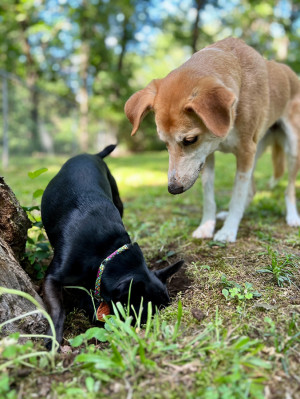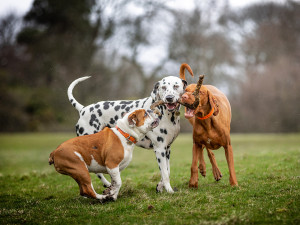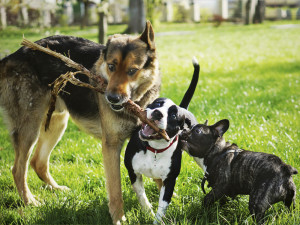How to Socialize a Puppy
Everything you need to know to get your new addition off to a good start.

share article

Your pet wants you to read our newsletter. (Then give them a treat.)
Ask any vet or behaviorist, and they’ll tell you that a pup’s first three months of life are key when it comes to socializing a puppy. Having rich and varied social experiences in their puppyhood improves a pup’s odds of growing into a balanced, confident adult dog — and who doesn’t want that for their pup?
Sure, an introverted pup who only likes you is adorable in theory — but the reality of a fearfulopens in a new tab, bite-y dogopens in a new tab is way less cute. The truth is, it’s not fair to you or your puppy to leave them without the tools they need to get along in this world, even if they will only ever know the sweetest parts of life (as it should be).
Socialization as a concept is often misunderstood, and that confusion gets in the way of starting puppies off right. Here’s what you need to know to properly socialize your new puppy.
What is puppy socialization, and why is it important?
Puppy socialization isn't just about introducing your pup to other dogs — it's about introducing them to new people, stimuli, animals, and environments. Getting your pup comfortable with the world at a young age is crucial because it will make it easier for them to interact with others in the future.
When should I start socializing my puppy?
The most effective puppy socialization period takes place between weeks three and 12 of the puppy’s life; then, it slams shut. Given that the last combination vaccineopens in a new tab (against distemperopens in a new tab, hepatitis, parvovirusopens in a new tab, parainfluenza, and coronavirus) is usually administered when a puppy is 16 weeks old, this timeline raises questions on when a puppy can safely be around other dogs.
Some veterinarians, shelters, and breeders advise new pet parents to wait until after a puppy has had their final set of vaccinations to allow them to interact with others. Unfortunately, by that time, the socialization period has ended, precluding the pup’s best shot at acquiring lifelong dog-on-dog social skills. So, what’s a pet parent to do? Let’s look at the research.
A studyopens in a new tab conducted by the University of California Davis School of Veterinary Medicine looked at the risks to partially vaccinated puppies of contracting parvoopens in a new tab at indoor puppy socialization sessions (socials). The results were reassuring.
It seems that puppies who have had only their first set of shots are at no greater risk of being infected with parvovirusopens in a new tab than those not attending socials. During the study, it was reported that none of the 15 puppies who contracted parvovirus had attended puppy socials, and that none of the puppies who attended puppy classesopens in a new tab contracted parvovirus.
This dovetails perfectly with the standard of care suggestedopens in a new tab by the American Veterinary Society of Animal Behavior (AVSAB), which unequivocally recommends pet parents should begin socialization classes for puppies as early as seven to eight weeks of age, and seven days after the first set of vaccines. The American Veterinary Medical Association, the ASCPA, and other dog health and behavior experts agree.
As the ASVAB statement reads: “The primary and most important time for puppy socialization is the first three months of life. During this time, puppies should be exposed to as many new people, animals, stimuli, and environments as can be achieved safely and without causing over-stimulation manifested as excessive fear, withdrawal, or avoidance behavior.”
It is important to note that structured puppy socials run by a variety of training and daycare facilities and other pet-related businesses take place indoors on non-porous surfaces, and “accidents” are cleaned up immediately with an antimicrobial solution. Porous surfaces, such as dirt, sand, and, in particular, those found at dog parksopens in a new tab, must be avoided until full vaccination.
People unaware of puppy socials are more likely to take puppies to places they should not be until they’re fully vaccinated, which includes dog parks, beachesopens in a new tab, and other settings with porous surfaces likely to harbor parvovirus-infected feces.
Understanding How Puppies Develop
Why is the window of opportunity so small? At the risk of stating the obvious, puppies develop much faster than humans. For example, puppies walk beautifully at three weeks, but it takes human babies about a year to reach that milestone. This acceleration affects cognitive function in dogs, which develops rapidly during the short socialization period; it’s during this time that a puppy’s framework for future social functioning evolves. A strong foundation built from a rich set of early experiences gives the puppy more context in which to evaluate and react to future stimuli in the environment, including people and other dogs.
The most important socialization period opens in a new tabof puppies — the time during which they readily incorporate new experiences into the developing worldviews that directly affect lifelong behavior — lasts from weeks three to 12. That’s it. Let’s break it down:
Puppy Socialization: Three to Seven Weeks
Puppies go through primary socialization during the first three to seven weeks with the puppy’s littermatesopens in a new tab, where they learn the ins and outs of being a dog — such as bite inhibitionopens in a new tab — from their mother and siblings. How they interact with humans during this period is important, too. Puppies who regularly interact and are handled during the first seven weeks will grow to be more stable, handle stressopens in a new tab better, be more curious, and learn faster than other pups.
Because most puppies (but not allopens in a new tab) remain with their mother and littermates for seven weeks, this means that new pet parents have just four weeks to make sure their puppy has ample opportunities to learn that there are many sorts of people and types of dogs in this world.
Puppy Socialization: Eight to 12 Weeks
Weeks eight through 12 are called the “second socialization period.” During those 28 days, a puppy’s brain is like a sponge, supple and ready to absorb and incorporate new experiences. This is, without question, the most profoundly important period in a dog’s life. Their brain is wired to absorb new experiences far more rapidly than during any subsequent period, and they learn not only to accept being around people and other dogs, but also to enjoy and seek out these experiences.
While not a perfect analogy, a puppy’s capacity to learn social skills is similar to a young child’s capacity to learn languages. Studies have shown that children younger than seven easily pick up new languages because their brains are capable of readily incorporating the sounds, words, grammar, and structure of multiple languages.
Like the puppy socialization period that ends at 12 weeks, this window closes for children around seven, after which language acquisition becomes far more difficult. A six-year-old child who spends a year in a Mandarin immersion class will come out fluent in the language. If an adult were to attend the same class, they would likely still be struggling with the basics. Their Mandarin would improve over time as they became more familiar and comfortable with the language, but they would never be as fluent as a child introduced at an early age. Likewise, dogs without the advantage of a rich socialization period can learn to thrive in social situations, but it takes a great deal more time and effort and has a lower chance of success.
Puppy socials do not guarantee that a dog won’t develop fear or aggression later in life; genetics, in-utero experiences, early nutritionopens in a new tab, and the first weeks with the mother and siblings also play key roles.
What are some safe ways to socialize my puppy?
It goes without saying that your puppy needs to be socialized to the environment in which they will be living. Over 80 percent of Americans live in urban areas, surrounded by many other people and dogs, which means the best way to socialize your puppy is by exposing them to an array of experiences.
Ready for your puppy socialization checklist? Here's how to properly socialize a puppy:
Sit with your puppy outside and watch as friends or neighbors do their daily activities.
Have friends wear different hats, sunglasses, and odd clothing, allowing your puppy to practice interactions.
Expose your puppy to things such as shovels, rakes, skateboards, bikes, and things with different textures and sounds, etc.
Take your puppy for car rides.
Go to a grocery store and sit in the parking lot, giving treats as your puppy watches people walk around outside.
Let your puppy walk over, under, and around various obstacles with varied textures.
Should I take my puppy to socialization class?
Attending puppy socialization classes allows puppies to learn and practice social skills. They’ll gain the skills needed to communicate, interact, play and read the body languageopens in a new tab of other dogs.
For some puppies, the sights and sounds at their first puppy socialization class may be overwhelming. Sometimes, a timid puppy will hang back for the first few events and then become a social butterfly. At their first puppy social, they may hang out under your chair and observe the other puppies playing. You do not need to coddle, overprotect, or force them to engage. By the second puppy socialization class, they may venture out, playing for a few minutes, then retreating to their safe place under your chair. By the third social, they may be actively seeking out playmates and practicing adult communication behaviors, which is the ultimate goal of these events.
A word of caution here: if you have a shy and fearfulopens in a new tab puppy and only take them to the first puppy socialization class (during which they sit overwhelmed and frightened under the chair), it almost certainly will backfire. They may only learn that being around other dogs is an unpleasant experience to be avoided.
How do I introduce my puppy to new people?
In addition to socials, a widely accepted goal is for a puppy to “meet” 100 people during these same four weeks: babies, children, elderly folks, men and women of all races, sizes and shapes, dressed in all sorts of clothing and carrying all kinds of implements — umbrellas, canes, plastic bags, etc. Wondering how to introduce your puppy to strangers? Do it at your dog's own pace, in a way that isn’t overwhelming. It's important that they get ample rest and are not overly fearful.
What if my puppy seems scared or overwhelmed during socialization?
While puppy socials and people-meet-and-greets are important, they must be positive experiences, not too overwhelming, and not too scary. As your pup’s parent, you need to shield them from overtly frightening situations (being pursued by an unruly, much larger puppy, for instance), but you must also allow them to jump into the rollicking puppy mayhem at their own pace.
If a dog has negative experiences with something (like other people or dogs) early on, they may learn not to be comfortable and social with people or other dogs but, instead, be nervous or afraid around them. For example, bringing a puppy to a large crowded place the day after being adopted is potentially damaging and not recommended. It’s much better to meet people one or two at a time and have those people provide treats, toys, and gentle touching in a calm setting. Exposure to people and other dogs that result in positive experiences for the puppy provides proper socialization. Being frightened and overwhelmed does not.
FAQs (People Also Ask):
What if my puppy shows signs of aggression during socialization?
Chances are, your puppy is scared and overwhelmed by the situation. Try again with only one dog or human at a time, and use treats for positive reinforcement.
Should I take my puppy to public places during socialization?
Yes, it's a good idea to take your puppy wherever you go so they can get used to different situations and stimuli. Just avoid the dog park until your pup is fully vaccinated.
References
Jeff Stallings, CPDT-KA
Jeff Stallings, CPDT-KA, who lives in Santa Cruz, Calif., owns Better Nature Dog Training and works with clients throughout the San Francisco Bay Area.
Related articles
![Close-up portrait of a wide-eyed Border Collie dog standing in the driveway of her home]() opens in a new tab
opens in a new tabWhy Is Your Puppy Such a Shy Guy?
It actually has a lot to do with genetics.
![single puppy standing outside]() opens in a new tab
opens in a new tabSingle Puppy Syndrome: One-Puppy Litter
One doesn’t have to be the loneliest number when it comes to your dog.
![A woman staring at her computer while holding her dog close.]() opens in a new tab
opens in a new tab10 Things to Consider Before Adopting a Pet
It’s a big decision, so check these boxes before you sign on the dotted line.
Are Dog Parks Good for Socialization?
Help! Should I take my young dog to the dog park for “socialization”?
![Two Golden Retriever puppies playing with a large blue tennis ball outside in the grass]() opens in a new tab
opens in a new tabWhat to Expect at Puppy Socialization Classes
A dog behaviorist schools us on why puppy classes are more about socializing than getting straight As.
![Three dogs biting a stick.]() opens in a new tab
opens in a new tabSome Like It Rough: Playing Vs. Fighting
Two animal behavior experts agree it’s usually play fighting. Here’s how you can tell.













